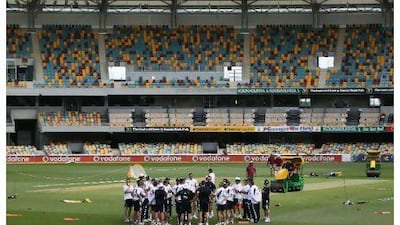These are surreal times. England begin their defence of the Ashes urn tomorrow with an undefeated record, including two outright wins, so far on tour. Their squad is settled and, startlingly, they have yet to field a sledge worthy of the name.
The assignment is not supposed to start like this. This is supposed to be Mission Improbable: Winning Against Australia in Australia - or the "land of the barbarian", as the Bodyline mastermind, Douglas Jardine, so tactfully put it.
All this calm is unsettling. "I'm still waiting for an Australian taxi driver to start sledging me," Matt Prior, the wicketkeeper, mused in an interview with an English newspaper this week.
"It just hasn't happened so far. Now I'm saying it out loud, I wonder if they're winding us up."
Prior and his fellow tourists steeled themselves for the ultimate challenge when they left England last month. "To win in Australia for me has to be the ultimate success," Sir Ian Botham, once said, "because Aussies live for sport."
Chief among said sport is their traditional pastime of Pom-baiting. According to the testimonies of past Ashes tourists, it is what makes winning in Australia so difficult.
It partly explains why England have won a mere three of their past 25 Tests in Australia.
That, and the fact Shane Warne, Steve Waugh, Glenn McGrath, et al have been opposing them, no doubt.
Mike Brearley, the captain who led England to a 5-1 Ashes win away in 1978/79, enjoyed rich success in Australia, yet claims it was never easily won.
"The bowlers are hard, the sun is hard, the pitches are hard," Brearley wrote in his newspaper column on Sunday.
"Australians are hard. Along with other responses, we encountered bravado and belligerence from the word go."
Many ploys have been tried to counter the anticipated hostile welcome. On one trip Brearley made to Australia, he grew a beard, strategically to look more physically imposing.
Three decades on and the facial follicles have returned, though Kevin Pietersen's is more dandy than dastardly.
Now that the Australian starting line-up is not as frightening as it was four years ago, the threat from the stands has also apparently dulled.
According to Michael Vaughan, the victorious 2005 Ashes captain, the tourists will rarely feel like the away team now due to the quantity and volubility of England's travelling support.
"Come the start of the Adelaide Test, we will have more supporters than them there," Vaughan said during his stopover in Dubai en route to Australia this week.
"I think the Brisbane crowd is the most hostile crowd. It is a big oval and they never put the England supporters in one area. So if there are England supporters there, they are all spread out so you never hear them.
"In Adelaide, we own the bank. In Perth, we own the bank. Melbourne for the first day is tough, but by the second day we own a huge section of the ground. In Sydney we just take over.
"The first game is a tough game, that is why they have such a good record there, because they have 30,000 idiot Aussies shouting at you, and another 11 playing against you."
The idea of the hostile home crowd always gets and airing when England head to Australia, but rarely the other way around.
Jason Gillespie suffered severe damage to his hitherto glowing reputation as a fast bowler when England targeted him in the 2005 series.
It was not just Vaughan and his fellow batsmen who attacked him. Gillespie was followed around the grounds of the UK by chants of "Where's your caravan?" from England supporters.
Yet he says English crowds are nothing like as intimidating as those found elsewhere.
"We don't whinge about that sort of thing," Gillespie said, speaking in Dubai this week. "It's only the English who do that.
"In my career I probably copped it about as much as any Australian player. The reason being was, as a fast bowler, you tend not to be the best fielder in the world, so they send you to all the far flung positions, like fine leg and third man.
"So you are on the boundary and you are right there copping it. It is completely down to how the individual handles it.
"To me, it was water off a duck's back.."
Five key men in the Ashes series
Graeme Swann, 31, England, bowler
Swann will want to lay down a marker from day one, with the spinner having been widely touted as the key player in the series. The Gabba is said to favour batsmen and seamers, but Shane Warne always regarded the extra bounce at the first Test venue as a major tool for spinners.
Ricky Ponting, 35, Australia, batsman
The fact Ponting is said to have lost it, having merely averaged in the mid-40s in the past 12 months, is an indicator of his greatness.His former strength, the hook shot, is now considered a weakness, and England's pace bowlers are sure to target that.
Kevin Pietersen, 30, England, batsman
Much like Ponting, England's best batsman will take guard in Brisbane with doubts lingering over his merits. Pietersen averaged over 50 despite being on the end of a 5-0 hammering last time in Australia, and he loves batting there.
Xavier Doherty, 28, Australia, bowler
Australia have settled on a 28-year-old with just two ODIs to his name as their spin threat. Left-arm spin is Pietersen's Achilles' heel, and Doherty's contribution will have to be a sizeable one if the home side are to triumph.
James Anderson, 28, England, bowler
The leader of England's attack is ironically the least well equipped of their four top seamers to prosper in Australian conditions. If the ball does not swing, he will have to find another way to get wickets. If he solves the conundrum, England will be half way to victory


